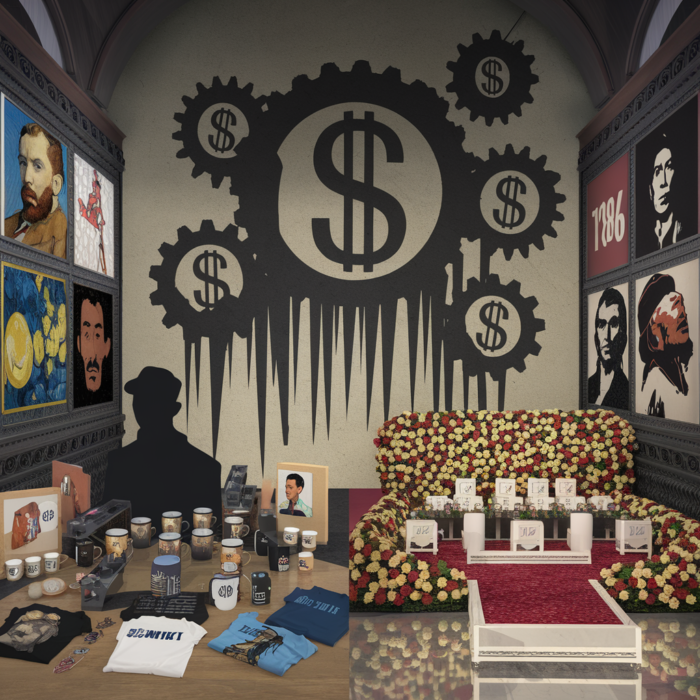Luigi Mangione, a CEO’s Demise, and the Parasites of Profit
In the grotesque carnival of capitalism, nothing escapes commodification—not revolution, not tragedy, not even death. The case of Luigi Mangione and the assassination of UnitedHealthcare CEO Brian Thompson lays bare this truth, with corporate and cultural vultures circling both the grave of the CEO and the rebellious spark of Mangione.
Here, we see capitalism in its purest, most shameless form: it doesn’t just exploit the living—it exhumes the dead and brands their legacies for profit. Luigi Mangione joins a long, grim tradition of figures whose defiance of the system is stripped of its soul and sold back to the masses. And the late Brian Thompson? A tragedy turned profit pipeline for his fellow corporate overlords.
Luigi Mangione: The Anti-Capitalist Turned Capitalist Brand
Let’s start with Luigi. A man pushed to the edge by a system designed to crush people like him. UnitedHealthcare, under Thompson’s leadership, was the emblem of corporate greed—denying claims, hiking premiums, and enriching executives while leaving millions to fend for themselves in a rigged game.
When Luigi struck back, his act was branded as the desperate cry of the oppressed. But within days, capitalism had already stolen his image and turned him into a marketable icon. Sound familiar?
Che Guevara—once the face of revolutionary fervor—is now the face of countless coffee mugs, t-shirts, and posters. His message, his sacrifice, reduced to a logo sold in chain stores owned by the very system he fought to dismantle. And Luigi? He’s becoming a digital-age Che. “Justice for Luigi” stickers, ironic memes, and merchandise flood online shops, allowing buyers to signal rebellion while comfortably consuming. It’s rebellion made palatable, marketable, and entirely profit-driven.

The CEO: Martyrdom for Money
Now let’s turn to Thompson. For a moment, you’d think corporate America might reflect on his actions—on how his policies profited from the suffering of countless ordinary people. But no, his death wasn’t a wake-up call; it was a gold rush.
UnitedHealthcare and its peers wasted no time in spinning the narrative. Thompson became a corporate saint, his life and work painted as noble pursuits. They milked his death for sympathy-driven marketing campaigns, urging customers to “stand with the company” in his memory. Even as they mourned publicly, you can bet the boardroom chatter was about how to turn this tragedy into new profit streams.
And it worked. Investors loved the drama. Stock prices stabilized, premiums rose, and a CEO’s blood became a financial lubricant for the machine to keep churning.
The Dead Artists’ Curse
Luigi isn’t the only victim here. His story echoes the fate of countless dead artists whose lives of poverty and rebellion were posthumously monetized. Vincent van Gogh sold only a handful of paintings in his lifetime, dying destitute. Today, his works generate billions for auction houses, museums, and private collectors—none of which would give him a dime were he alive.
Frida Kahlo, whose art bled with anti-capitalist sentiment, is now a darling of corporate merchandise. You can buy a Kahlo-branded lipstick or tote bag, but her warnings about systemic exploitation? Those are conveniently left off the packaging.
This is how capitalism operates: it doesn’t just exploit the living—it digs up the corpses of those who dared to defy it, polishes their stories, and sells them to the highest bidder. It’s a parasitic system that feeds on rebellion while silencing its true message.
The Parallels: Mangione, the Revolutionaries, and the Artists
Luigi’s story sits squarely in this grotesque lineage. Like Che, he’s becoming a revolutionary logo stripped of its context. Like van Gogh, his desperation will be turned into profit by those who wouldn’t lift a finger to help him in life. And like Kahlo, his struggle will be co-opted by the very forces he fought against.
Meanwhile, Brian Thompson’s death parallels another grim capitalist tradition: the sainting of the oppressor. Corporations glorify their fallen leaders, turning their deaths into PR opportunities while continuing the very practices that create people like Luigi.
Capitalism’s Gravediggers
At its core, this story isn’t about Luigi or Thompson—it’s about the system that made them both. A system where rebellion and tragedy alike are just raw materials to be commodified. Luigi’s defiance? Branded and sold. Thompson’s death? Packaged into a corporate narrative.
This isn’t just irony; it’s the essence of capitalism. It consumes everything: the living, the dead, the oppressed, and the oppressor. It has no shame, no limits, and no humanity.
A Call to Action

So, what do we do? The first step is to see through the lies. Don’t buy into the Luigi t-shirts or the Thompson tributes. Understand that both are victims of a machine that thrives on exploitation.
But more importantly, refuse to play the game. Stop feeding the system that profits from rebellion while suppressing its true meaning. The ultimate rebellion is to build something better—a world where neither artists nor revolutionaries are exploited, where CEOs don’t profit off the misery of millions, and where no one has to pick up a weapon just to be heard.
Until then, the machine grinds on, and we remain its fuel. But perhaps, just perhaps, Luigi’s story can be more than a brand. Maybe it can be a spark.


